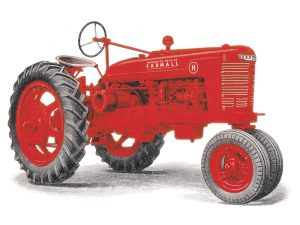In all areas of New Zealand’s agricultural or horticultural landscape, you would be hard pressed to find anyone who hadn’t been exposed to a Farmall tractor, whether it be a Model A, B, M – or one of the more recent models.
It’s not surprising then that global player Case IH is using 2023 to kick off global celebrations honouring the 100-year anniversary of the tractor.
The iconic Farmall model was initially introduced in 1923 as the all-purpose tractor designed to revolutionise the agriculture industry. Initially, the tractor evolved from a 3-wheeled cultivator with an engine over the rear axle, that proved to be quite unstable.
Engineers moved to a chassis design and added a fourth wheel, pitching the new Farmall as a lightweight utility tractor against much heavier units such as the IH Titan and Mogul.
By 1931, the Farmall F was launched for farmers with more acreage, followed in 1939 by a second generation Farmall. In 1941, saw the arrival of the world’s first diesel-engine row crop tractor.
By 1947, the one millionth machine rolled off the production line. This was followed by milestones over the next decades, including the first 2WD row crop tractor to exceed 100hp, sales in 125 countries and the 5 millionth Farmall built in 1974.
Having “disappeared” between 1974 and 2002, as company takeovers and acquisitions were the order of the day, the Farmall name was reintroduced in 2003 and saw Case IH continue to expand the line-up of products with up to 120 horsepower.
The Farmall legacy continues today with an offering of more than 30 models with ranges – such as the B, JX, C, U and JXM offering 30 to 140hp.
“In 1923, we set out to design a tractor that could replace horses, and today, our Farmall still serves as the workhorse on farms across the globe,” said Scott Harris Case IH global brand president.
“Generation after generation, Farmall has been a symbol of modern farming, and we’re excited to bring these stories to life over the course of 2023.”
The celebration will take place during a year-long, multi-faceted campaign, anchored in the concept of Farmall being “The One for All”, through social media, video stories and a dedicated microsite.


















